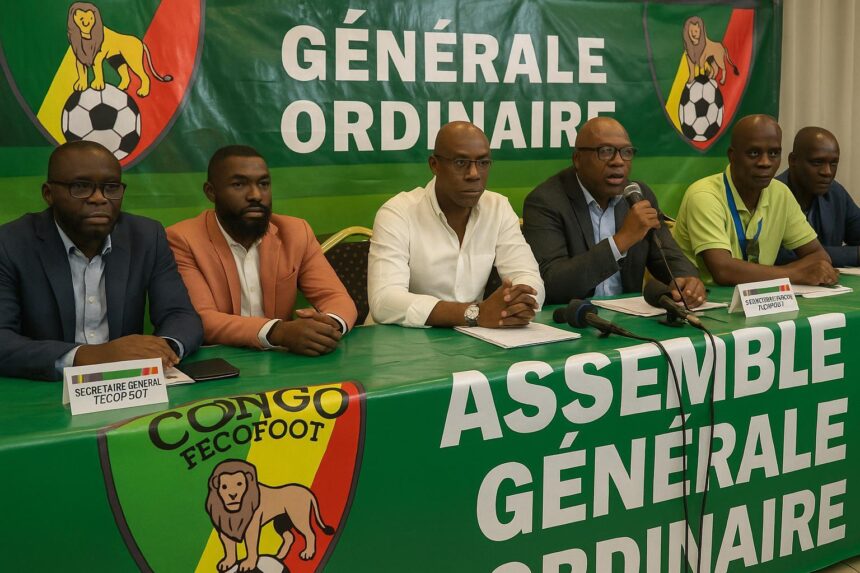Unexpected ruling empties the hall
Delegates from every league seat in Brazzaville’s Maison du Football expected routine votes on budgets and calendars on 4 October. Instead, a fresh ordinance, signed that very morning by the dean of investigating judges at the city’s High Court, ordered an immediate postponement of the ordinary general assembly.
- Unexpected ruling empties the hall
- A short statement, then closed doors
- Legal reasoning still unclear
- FIFA observer takes notes
- Autonomy principle under spotlight
- Clubs caught in limbo
- Youth voices grow impatient
- Government encourages dialogue
- Procedural next steps
- Financial stakes are high
- Players remain optimistic
- Fans call for transparency
- Media’s role in calming tempers
- Hope for a rapid restart
- Waiting for the whistle
A short statement, then closed doors
Second vice-president Carle Boniface Malalou stepped to the microphone, holding the document many delegates had only seen on social media minutes earlier. He told the room that Fécofoot would respect the injunction in the spirit of institutional dialogue and therefore could not legally open its session.
Legal reasoning still unclear
As of today, the federation has not received the full motivation of the court’s decision. Sources close to the file say a private complaint over electoral rules triggered the injunction (Les Dépêches de Brazzaville). Until lawyers study the text, leaders prefer discretion to confrontation.
FIFA observer takes notes
Franciny Samba, dispatched by FIFA’s development department, observed the abrupt adjournment in silence. His only duty, insiders explain, is to report factual events to Zurich for assessment. Under FIFA statutes, national associations must manage affairs without external interference, including from courts of ordinary jurisdiction.
Autonomy principle under spotlight
Article 19 of FIFA’s statutes insists on full independence for member bodies. In previous African cases, suspensions were imposed when governments or courts were judged to interfere persistently. For Congolese football lovers, the memory of 2020’s brief ban still lingers. Most pray history will not repeat itself.
Clubs caught in limbo
League sides such as AS Otohô and Diables Noirs already launched pre-season camps, paying hotels and medical tests in anticipation of a calendar vote this week. “Players ask us every day about kick-off dates,” sighs a team manager who requested anonymity to avoid fuelling tension.
Youth voices grow impatient
Outside the venue, student supporter Mireille Nkodia said football remains “the safest playground we have”. She worries that another prolonged break could push youngsters toward streets instead of stadiums. Grass-roots coaches share her fear; many rely on match-day earnings to fund school supplies for academy players.
Government encourages dialogue
Sports ministry officials, contacted by Congo-Site, stress that the executive values both judicial independence and the orderly progress of national competitions. “The ministry remains confident that Fécofoot and the courts will find a swift, lawful solution,” a spokesperson noted, adding that support for youth programmes remains unchanged.
Procedural next steps
Fécofoot’s legal team plans to file an urgent appeal early next week. If the injunction is lifted quickly, a new assembly could occur before mid-October. Otherwise, exceptional virtual sessions – allowed since 2021’s health measures – may be considered to adopt urgent budget lines.
Financial stakes are high
Every month of delay risks freezing funding from FIFA’s Forward programme, estimated at 6 million USD per cycle. Those resources bankroll stadium renovations in Pointe-Noire and equipment for women’s football. Club presidents warn that any interruption could derail ongoing infrastructure upgrades before the rainy season sets in.
Players remain optimistic
National team midfielder Prince Ibara, currently training in France, told Radio Congo he trusts “dialogue will win”. He reminded fans that the Red Devils’ next World Cup qualifier arrives in November, urging all actors to “keep the focus on the pitch” rather than boardrooms.
Fans call for transparency
Supporter groups in Brazzaville suggest streaming the eventual assembly live to rebuild trust. “Seeing debates with our own eyes calms rumours,” argues Landry Louvenzo, head of a Ligue 1 fan club. Fécofoot officials say technical options are being evaluated to make proceedings more accessible.
Media’s role in calming tempers
Local outlets have largely avoided sensationalism, instead relaying verified updates and reminding readers that a court order remains a legal fact, not a verdict on guilt. Journaliste Ines Matsiona underlines that balanced coverage “helps prevent keyboard wars” on social networks already tense over rival club loyalties.
Hope for a rapid restart
If the assembly can reconvene within the month, the National League projects a 30-week season ending next July, leaving room for the 2024 Coupe du Congo. Coaches believe a compressed but stable timetable is preferable to an open-ended waiting period that drains sponsors’ patience.
Waiting for the whistle
For now, balls stay idle and whistles silent as administrators navigate legal corridors. Yet the mood among players and fans remains one of guarded confidence. Congolese football has weathered rough tackles before; many believe teamwork between courts, federation and international partners will soon put the game back in motion.




















